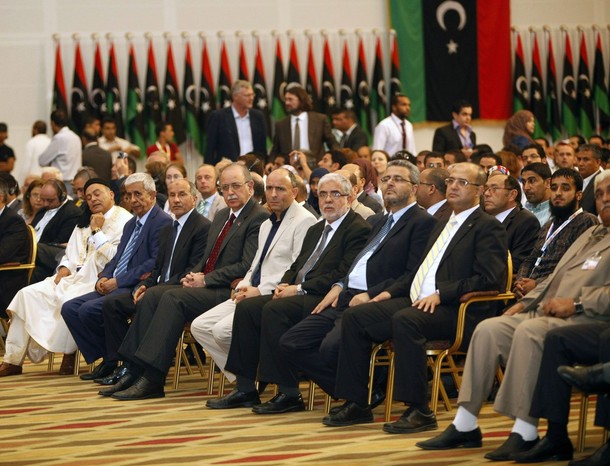Libya’s National Transitional Council (NTC), the highest governing since last year’s overthrow of Muammar Qaddafi, will turn over authority to the newly elected General National Congress (GNC) tomorrow. What does the turnover portend for the selection of a new government? What are the powers of the GNC and what will its role be in the writing of a new constitution?
The GNC elected in July faces a wide array of challenges, and it does so with powers that are not at all well defined. In August 2011 the NTC promulgated a draft Constitutional Charter which was supposed to govern the transitional process. In theory, this charter outlines the provisory powers for the transitional period as well as a timeline for the constitutional drafting process. In reality, it is so vague and insufficient that the NTC has intervened more than once with legislative decrees to close gaps in the charter.
In particular, regarding the task of drafting the new constitution, the NTC has recently established that the new GNC will not debate a new constitution within its ranks, nor will it appoint a constitution drafting committee as was originally envisioned. A constitutional committee will instead be chosen in general elections, the date of which has yet to be determined. This last decision has raised confusion and doubts because of its ambiguity, not to mention the difficulty of organizing an election immediately after the ones just held. Technically, the Constitutional Charter has no authority over the GNC, which now is the supreme power of the country and is not subject to any previously enacted law.
In its first meeting on August 8, the GNC is supposed to elect a president and a deputy by majority via a secret ballot. These leaders will have the powers and the duty to direct and manage the works of the assembly. It is up for discussion whether the president of the GNC will also be the president of the country or if a different figure should be appointed. According to the Constitutional Charter, the GNC should appoint a new government within thirty days from its first meeting. Until that time, the current transitional government of Abdel Rahman Al-Keib will remain in office.
Once these first decisions are made, the GNC will begin a debate about the creation of the constitutional committee. It will be free to confirm or reject completely the Constitutional Charter and the decisions taken by the NTC. Alternatively, it will be free to adopt, following Tunisia’s example, a mini-constitution that outlines in depth the provisional powers for the transitional period and governs the work of all institutions, including the government, until the adoption of the new constitution. In this new charter, the assembly could also lay out the conditions and the principles for appointing a committee to draft a constitution, as well as define its working procedures. For example, the case of Tunisia has shown that having one assembly working on both constitutional drafting and regular legislation creates confusion and can paralyze the institution in various debates.
It would be more advisable for Libya to appoint a committee that would deal with the constitutional drafting exclusively, thus freeing the GNC from this duty and allowing it to concentrate on legislation in support of the government’s work. The constitutional committee could be formed, in order to appease regional tendencies and local allegiances, by an equal number of members from each of the three regions which Libya has historically been divided: Tripolitania, Fezzan, and Cyrenaica. The most important thing is that the committee be composed of constitutional experts, experts in transition mechanisms, political scientists, and economists – in other words, those who can provide technical expertise and prevent the creation of legal loopholes. A popularly elected committee, on the other hand, would write a constitution that reflects majority opinion and the values of the moment, rather than a durable democratic governing framework. The absence of politicians in a technocratic-led committee would be balanced by the fact that the draft constitution would have to be passed by the GNC first and then within thirty days approved by two-thirds of voters in a popular referendum.
Within one hundred eighty days from the enactment of the new constitution, general public elections are to be conducted. The election of the first Libyan parliament will conclude the transitional period.
For all of this to work, it is important that the GNC avoid the ambiguities and opacity that have characterized the working of the NTC and ultimately led to its de-legitimization in the eyes of the Libyan people. The first meetings of the GNC should be devoted to defining, in the most open and public way, the roadmap for its workings and its tasks. This will create consensus and strengthen a transitional process that remains fragile, despite major steps forward.
Karim Mezran is a senior fellow with the Council’s Rafik Hariri Center for the Middle East.
Image: general%20national%20congress%20libya.jpg
